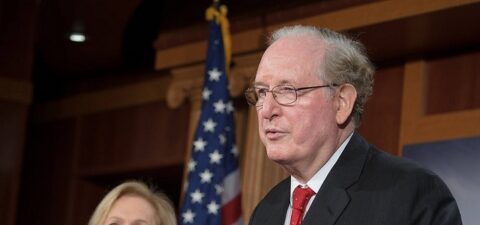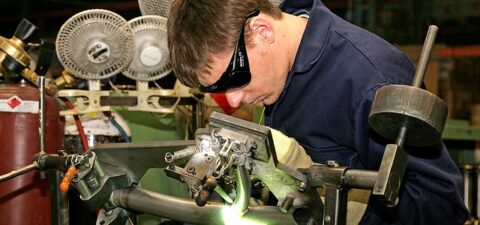Economics

How the Immigration Reform Bill Could Help Undocumented Farmworkers and Growers
Approximately 11 million undocumented immigrants could become eligible for legal status under S. 744, the immigration reform bill the Senate is considering, including millions of undocumented farmworkers. The importance of finding a way to create a legal workforce within the agriculture industry is critical, as undocumented farmworkers make up an estimated 53 percent of agriculture workers. Read More

Medicare’s Health and Well-Being Depends on Immigrants
Immigrants’ access to affordable health care is one of the most contested issues in the current immigration reform debate. Most advocates of comprehensive immigration reform point to the need to ensure that aspiring citizens have opportunities to access appropriate health care since such access will impact their ability to learn, to work, and to contribute to their communities. On the other end of the spectrum, anti-immigration groups tend to inaccurately emphasize that newly legalized immigrants would represent an excessive fiscal burden. This prediction is based on a misleading characterization of immigrants as “takers”—in other words, as disproportionate consumers of public resources. Several studies have shown that this is just not the case. In fact, non-citizens use public benefit programs at a lower rate than similar low-income native-born citizens. With regard to medical expenditures in particular, immigrants tend to use less health care than their U.S.-born counterparts. Read More

Experts from Left and Right Agree on Economic Power of Immigration Reform
In recent years, study after study has demonstrated a simple yet economically powerful truth about broad-based immigration reform: workers with legal status earn more than workers who are unauthorized—and these extra earnings generate more tax revenue, as well as more consumer spending, which creates more jobs. As a new report from the Center for American Progress (CAP) points out, this fact implies that states with appreciable unauthorized populations stand to gain economically from immigration reform that includes a legalization program for the unauthorized. Moreover, a new open letter to Congressional leaders released by the conservative American Action Forum illustrates that it is not only liberal advocacy groups like CAP which recognize the economic potential of immigration reform. Read More

The W Visa: Why the Economy Benefits from A Robust New Worker Program
The Senate Judiciary Committee returns to its task of marking up S. 744 tomorrow, taking up, among other things, possible amendments to the W visa program for new nonimmigrant workers. This new program, blessed by both business and labor, is an effort to acknowledge the need for a more flexible system for meeting the demand for workers in certain occupations and industries that require less-skilled workers. At Tuesday’s hearing, several Senators challenged the idea that the American workforce needed to be supplemented with immigrant labor, but the evidence is overwhelming that there is both a need and an economic benefit to having a flexible and responsive program in place to bring in new workers where they are most needed. Read More

What Do You Think About Immigration Reform?
As the Senate continues to shepherd a comprehensive immigration reform bill through the legislative process (day two of mark-up in the Senate Judiciary Committee begins tomorrow), it becomes clear how many issues are at stake in reform and how interconnected they are. It’s also overwhelming at times. That’s why the American Immigration Council is attempting to divide the issues into smaller discussions on our wiki, ThinkImmigration.org. Read More

The Important Role of Immigrants in America’s Innovation Economy
This week, the U.S. Senate Committee on Commerce, Science, and Transportation weighed in on immigration reform with a hearing on the role of immigrants in America’s innovation economy. Remarks from Sens. Rockefeller (D-WV) and Thune (R-SD) noted the contributions of immigrant innovators and entrepreneurs. Immigrants in the United States were named as inventors or co-inventors on 25.6 percent of international patent applications filed from the U.S. in 2006. Furthermore, temporary workers and permanent residents made contributions to over half of the international patents filed by several large, multi-national companies. Temporary and permanent foreign-born workers represent at least 24 percent of the nation’s scientists and 47 percent of engineers with doctoral degrees. Read More

Social Security Administration Says Immigration Reform Will Increase Tax Revenue, Boost Economy
Will the immigration reform bill create millions of jobs, boost GDP, and help balance the budget? A new report by the Social Security Administration says that it will, by putting undocumented immigrants on the tax rolls and allowing them to participate fully and legally in the U.S. economy. Read More

How to Accurately Estimate the Economic Impact of the Senate Immigration Reform Bill
One of the most important questions being asked about the Senate immigration reform bill (S. 744) is how it will impact the economy. There is already a broad consensus among economic experts that immigration reform would be a net economic benefit in terms of jobs, wage levels, tax revenue, and Gross Domestic Product (GDP). As reported in Politico on May 8, for instance, a new study by the Social Security Administration estimates that “by 2024, the immigration bill will have created 3.22 million jobs, and boost GDP by 1.63 percent.” However, the most widely awaited estimate is that of the Congressional Budget Office (CBO), which will soon be “scoring” the bill in terms of its fiscal consequences. Read More

Keeping U.S. High-Skilled Temporary Worker Visa Programs Workable
When analyzing higher-skilled guest worker visa programs, such as the H-1B and L-1 programs, critics often fail to acknowledge the very different and important purposes that these programs were designed to serve, and the complicated requirements already in place to protect against abuse or exploitation. There is no denying that we can and should improve these programs and the strategies used to enforce them. However, given the well-established economic benefits of these programs, and the challenges employers face finding highly skilled workers, particularly in technical fields, it is essential that any proposed reforms not impose restrictions that may make these programs completely unworkable. Read More

High-Skilled Immigration and Entrepreneurship in the Senate’s Immigration Bill
On the road to reform, the Senate’s Border Security, Economic Opportunity, and Immigration Modernization Act contains several changes and new provisions for skilled immigration and entrepreneurship. Specifically, the bill provides balanced reforms to the H-1B nonimmigrant visa for high-skilled individuals, various provisions for highly skilled individuals through permanent employment-based immigration, and a new INVEST visa for entrepreneurs. Read More
Make a contribution
Make a direct impact on the lives of immigrants.
